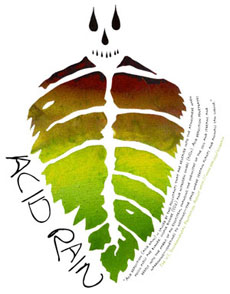Public Health Contest Seeks Powerful PSAs
By Caperton Gillett
 |
Erin Wright's winning poster "Acid Rain" from KoronisFest 2010. Click on the image to see a larger version. |
According to myth, Koronis was a Greek princess, consort to the god Apollo and mother of Asclepius, god of medicine, who begat Hygeia, goddess of hygiene. “It occurred to me—she is the grandmother of public health,” says UAB neurologist Steve Rudd, M.D., M.P.H. Rudd chose Koronis as the namesake for his own brainchild: a community competition focused on spreading the word about public health.
The inaugural KoronisFest, held in April 2010, offered awards for the best public service announcements (PSA) in three categories: live action, animation, and posters. The competition attracted submissions from UAB students and faculty, as well as filmmakers and artists in the larger Birmingham community. Entries covered topics from pollution to organ donation, with presentation ranging from the compelling to the entertaining to the bizarre. But they shared one common thread, says School of Public Health dean Max Michael, M.D.: “They’re funky.”
Inspiration for the competition came largely from a course called Narrative Public Health, team-taught by Rudd and Michael, which explores techniques to communicate public health messages to different audiences. The duo brought in Michele Forman, M.A., documentary filmmaker and ethnographic filmmaking instructor at UAB, to teach a session on the rudiments of film production for PSAs. Students responded enthusiastically, and many of their projects became entries in KoronisFest.
| Get In On the Act Do you think you have what it takes to create an attention-grabbing PSA? KoronisFest 2011 is now accepting submissions in three categories—live action, animation, and poster—with multiple cash prizes (up to $500) available in each. Deadline is March 3. Click here to learn more. |
Adding the Attitude
Decades ago, PSAs relied heavily on shadowy images and ominous threats of health risks, Michael says. More recently, they have featured celebrities delivering dry public health messages, aired early in the morning to an audience of insomniacs. “The usual kinds of things you see on TV tend to highlight specific diseases rather than offer preventive strategies. And honestly, it’s kind of hard to do a 15-second PSA around complicated issues of lifestyle,” Michael says. “What I like about the PSAs our students are creating is that they’re edgy and funky. They’re just fun.”
“One of our winning PSAs had [the sexually transmitted disease] chlamydia doing a sort of dance routine,” Rudd says. (That would be Justin Meunier’s live-action category winner, which featured a costumed character—labeled “Chlamydia”—cavorting at a party.) “I can’t imagine a public health official somewhere saying, ‘This is how we ought to approach this,’” Rudd continues. “But it’s something that really needs communicating. And to be effective in targeting young people who are not only constantly bombarded by, but actively creating, information on multiple platforms, a message has to be arresting to cut through.”
|
Click on the images above to see Mark Cervero's "Healthy Drink Choices" (top) and Justin Meunier's "Chlamydia" (bottom). |
Animation category winner Mark Cervero, an alumnus of the School of Public Health, promoted healthy drink choices with a soda-swigging man growing disturbingly fat. And UAB Department of Art and Art History chair Erin Wright, M.F.A., won the poster competition with a striking composition about acid rain.
Bring On the Funk
These postmodern messages, Michael says, are what the public health community should be promoting. “The perfect world would be one in which you would translate that same kind of edgy, funky thinking into PSAs that are aired during primetime, when they’re going to have an impact,” he says.
Rudd and Michael have taken steps to make sure that locally produced PSAs reach a wider audience. They have created a reciprocal partnership with Birmingham’s annual Sidewalk Moving Picture Festival to screen KoronisFest entries, while Sidewalk filmmakers may receive awards from the School of Public Health for films “that have a public-health slant to them,” Rudd says.
KoronisFest winners receive a monetary prize and a plaque bearing the image of a crow, which is the perfect symbol for the event, Rudd says. The crow is associated with Koronis herself, he explains—and it is the only animal that responds to the calls of other species. “We bring a bunch of diverse voices together who listen to each other and try to come up with something crowlike—the queen of unconventional solutions—that benefits the public’s health.”

